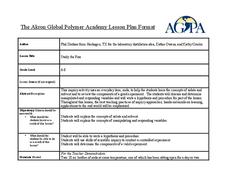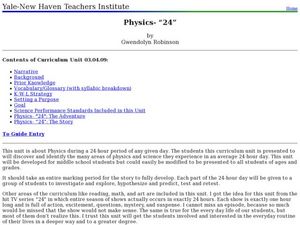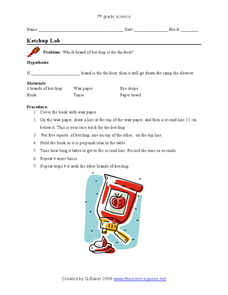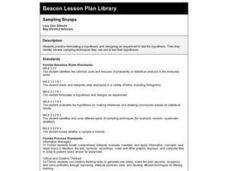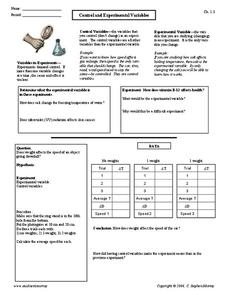Curated OER
Practice Evaluating Experimental Designs
In this experimental design worksheet, students evaluate experiments using a design checklist. They suggest ways to improve the experiments and they identify all the components of the design.
Curated OER
The Egg Activity
Students comprehend the three basic steps of science: 1) Observation, 2) Statements of cause and effect (Hypotheses), and 3) Testing. By working with an egg, students are required to observe an object that is very common to them. This...
Curated OER
Primes and Prime Factors
For this primes and prime factors worksheet, 8th graders solve 21 different problems to include identifying each number as prime, composite, or neither prime nor composite and listing all the primes less than 200. Then they complete each...
Curated OER
Study the Fizz
Middle schoolers experiment to determine which bottle of soda has more dissolved carbon dioxide. In this solutions lesson, students use the scientific method to test the amount of carbon dioxide in bottles of soda. They identify and...
Curated OER
Physics -- 24
Learners record all of the instances of physics and science they are involved with in a full day. As a class, they complete a KWL chart on physics and read a story about Murphy's Law and the character's experiences. Individually, they...
Mr. Science
The Scientific Method
First, ask a question and then, do research. Next, form a hypothesis, and conduct an experiment. Make observations, gather and analyze data, and then state a conclusion based on the results. This is the scientific method, and here is a...
Curated OER
Ketchup Lab
In this ketchup worksheet, students investigate the thickness of different types of ketchup. They hypothesize, identify their independent and dependent variables, test their hypothesis and write conclusions based on their data.
Curated OER
Testing the Hypothesis
Students create and conduct various experiments to determine the origin of a family artifact, and then determine whether their results were successful. Students summarize their results and evaluate whether their hypotheses were correct.
Curated OER
Identifying Fossils
Learners create model fossils. In this fossils lesson, students view pictures of fossils and compare and contrast these fossils. Learners read about fossils and create a database chart with the facts they learn. Students construct...
Curated OER
Science and Measurement
A great start to activate thinking about the scientific method, instruments, measurements, accuracy, constants and laws. Each slide describes important procedures and examples essential for the study of science.
Polar Trec
Do Microorganisms Live in Antarctica?
Can microorganisms live in the dry, cold climate of Antarctica? Young scientists view a research project measuring microorganisms in the Taylor Glacier. They record the findings from dirty ice, clean ice, boots, sediment, and more. Then...
American Psychological Association
Do Cookies/Donuts Improve Memory? Errors in Methodology
If the methodology is skewed, the results will be skewed. That's the takeaway from an exercise designed to get class members thinking about research methods and statistics gathering. Instructors manipulate the testing environment to...
NOAA
A Watery World
With about 70% of the earth's surface covered in oceans, it's fair to say that we live in a very wet world. Young scientists gain a better appreciation of this fact as they use maps to identify the world's ocean basins in the first...
California Academy of Science
The Heat is On: Cause and Effect and Climate
The higher the number of letters in the final word for the National Spelling Bee, the higher the number of people killed by venomous spiders. Obviously, those two facts correlate, but no causation exists. Scholars view data based on...
Curated OER
Examine the Data
Seventh graders examine a teacher-created database and identify specific variables and develop hypothesis statements as to their possible effect. They create a summary statement either proving or disproving their hypothesis.
Discovery Education
Motion in the Ocean
How do temperature changes affect ocean currents? Scholars explore convection currents by demonstrating the flow of water in a baking dish. They use ice, heat, and food coloring to see currents. Then, they draw conclusions about their...
Curated OER
Sampling Snoops
Pupils practice formulating a hypothesis and designing an experiment to test the hypothesis. They identify several sampling techniques they can use to test their hypotheses.
Curated OER
Solving Problems
In this solving problems worksheet, students answer twelve multiple choice questions about problem solving in science and the steps of the scientific method. These include identifying the problem, forming a hypothesis and setting up the...
Curated OER
Popcorn Science
Students identify and apply the scientific method through an experiment with popcorn. Then they identify what independent, dependent, and control variables are and create a list of different variables that affect popcorn popping....
Curated OER
Thinking Like a Scientist
Young scholars explore the scientific method. Students identify the steps in the scientific method and explain what each step means. Young scholars use these steps to determine if boys or girls are taller in their classroom.
Curated OER
Observing Osmosis in a Chicken Egg
Tenth graders develop a hypothesis and explain what they observed on an activity. For this investigative lesson students observe osmosis and report their data using a graph.
Curated OER
Independent Investigation
For this science worksheet, students write what they want to discover and identify what they feel will happen. Then they design an experiment and write the steps for it in the space provided. Students also create a data table or chart...
Curated OER
Control and Experimental Variables
In this control and experimental variables activity, high schoolers read about the variables in an experiment and practice identifying each in 2 experiments. Students analyze the data in an experiment, identify the hypothesis and the...
Curated OER
Conditional Statements
In this geometry worksheet, students read given sentences and identify the hypothesis and the conclusion of the conditional statements. There are 21 questions.





